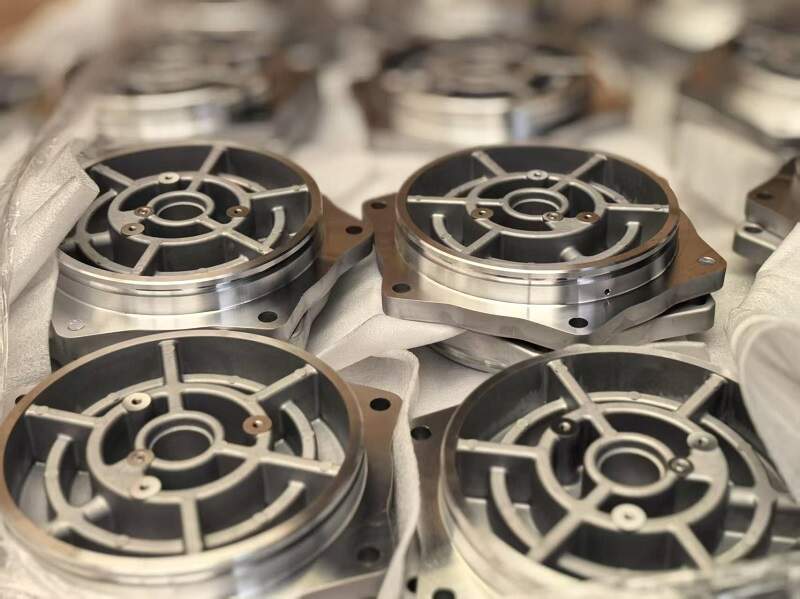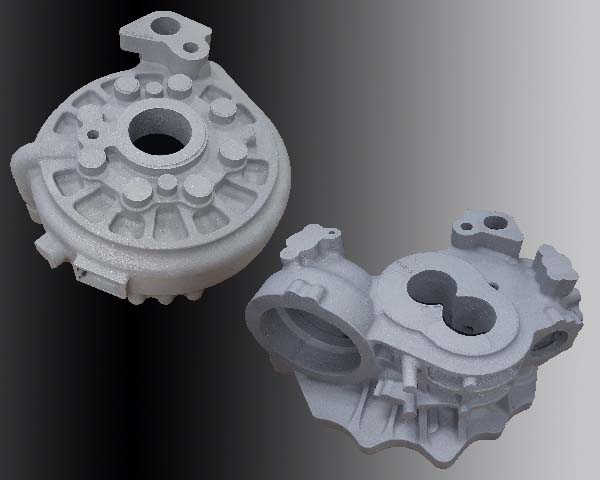Aluminum Foundry services that enhance your manufacturing output
Wiki Article
Exactly How Aluminum Foundries Contribute to Various Industries: A Comprehensive Overview
Light weight aluminum foundries function as vital providers throughout numerous fields, including auto, aerospace, construction, and electronics. They create elements that are not just light-weight yet also durable, boosting the performance of different items. With sophisticated spreading methods and a dedication to sustainability, these shops are adjusting to fulfill developing industry needs. As they introduce, the impact of aluminum castings on different applications raises important concerns concerning the future of manufacturing. What exists in advance for this crucial industry?The Role of Aluminum Foundries in the Automotive Sector
As the vehicle sector progressively embraces lightweight products to boost fuel performance and efficiency, light weight aluminum shops play an important role in this advancement. These centers concentrate on the production of light weight aluminum spreadings, which are necessary parts in modern lorries. By offering high-strength, lightweight parts, light weight aluminum shops make it possible for suppliers to lower the general weight of automobiles, inevitably leading to enhanced fuel economic situation and reduced emissions.Aluminum's resistance to corrosion further improves automobile long life, making it an appealing choice for car manufacturers. Factories use advanced strategies such as die spreading and sand spreading to develop specific and detailed components, ensuring that they fulfill strict sector standards. Additionally, the capacity to reuse light weight aluminum successfully contributes to an extra lasting production process. As the automobile industry proceeds to innovate, light weight aluminum shops will stay crucial in delivering the materials necessary for the next generation of cars, sustaining both efficiency and environmental goals.

Aerospace Applications of Light Weight Aluminum Castings
Aluminum spreadings are integral to the aerospace market, using a combination of light-weight strength and resilience that is critical for aircraft performance. These castings are used in various components, such as engine parts, architectural frames, and landing gear, where weight reduction is important for gas effectiveness and general security. The versatility of light weight aluminum enables for intricate geometries that improve aerodynamic performance while maintaining structural integrity.In addition, innovations in casting innovations have actually improved the accuracy and surface coating of light weight aluminum elements, minimizing the need for substantial post-processing. This effectiveness not only speeds up manufacturing timelines yet likewise decreases prices, making aluminum an eye-catching option for manufacturers. The deterioration resistance of light weight aluminum guarantees durability and dependability in rough operating environments, further establishing its function in aerospace applications. As the industry develops, light weight aluminum castings continue to be a necessary material, driving innovation and supporting the development of next-generation airplane.
Construction Sector Developments Via Aluminum
The construction sector has increasingly embraced aluminum because of its lightweight homes and versatility, paralleling its successful applications in aerospace. Technologies in light weight aluminum style have resulted in stronger, much more effective frameworks, making it possible for architects and contractors to discover new possibilities. The product's resistance to rust and low upkeep requires make it particularly appealing for both residential and commercial jobs.Light weight aluminum's adaptability promotes the production of complex styles, permitting for visual enhancements that were formerly difficult with typical products. Prefabrication strategies have likewise advanced, using light weight aluminum to lower building and construction time and prices substantially. Additionally, the energy effectiveness of light weight aluminum systems-- such as window structures and roof covering-- contributes to lasting building practices, aligning with contemporary ecological standards. As the construction sector remains to welcome these advancements, light weight aluminum's duty is expected to broaden, driving additional advancement and adding to the advancement of resistant infrastructures.
Electronic devices and the Demand for Lightweight Light Weight Aluminum Components
With the fast development of modern technology, the demand for lightweight light weight aluminum parts in the electronic devices sector has surged. As devices end up being a lot more compact and portable, manufacturers seek products that use both durability and weight decrease. Aluminum, with its excellent strength-to-weight proportion, has actually arised as a preferred selection for parts such as housings, heat sinks, and structural assistances.The use of aluminum not just enhances product efficiency but likewise contributes to power effectiveness, as lighter gadgets require much less power throughout operation. Furthermore, light weight aluminum's outstanding conductivity makes it excellent for electronic applications, guaranteeing efficient warmth dissipation and reducing the risk of getting too hot.
As customer preferences change in the direction of lightweight and sleek devices, aluminum foundries play a necessary role in fulfilling the progressing demands of the electronic devices sector (Aluminum Foundry). Their ability to create exact and high-quality light weight aluminum components sustains technology, allowing producers to push the borders of design and capability
Sustainable Practices in Aluminum Foundries
As the electronic devices industry progressively focuses on sustainability, aluminum factories are adapting their methods to straighten with these environmental objectives. Numerous factories are executing recycling programs that reclaim light weight aluminum scrap, considerably reducing the need for basic materials and lessening waste. By utilizing energy-efficient modern technologies, these centers are decreasing their carbon footprint; for example, employing electric furnaces rather than standard gas-fired ones can result in significant power cost savings.Furthermore, light weight aluminum shops are buying water conservation measures, such as closed-loop systems that reuse water made use of in cooling down procedures. These methods not just reduced water intake however additionally reduce the environmental influence related to wastewater discharge. Several foundries are exploring eco-friendly power resources, such as solar and wind power, to satisfy their power requires sustainably. Via these campaigns, aluminum foundries exhibit a dedication to ecological stewardship while remaining to meet the needs of the electronic devices market.
Future Patterns in Aluminum Factory Technologies
Emerging technologies are positioned to transform light weight aluminum foundries, boosting effectiveness and item high quality while advancing sustainability initiatives. Technologies such as man-made webpage knowledge and equipment learning are expected to enhance manufacturing procedures by forecasting equipment failings and enhancing source allowance. The integration of advanced robotics will streamline procedures, reducing labor prices and decreasing human error.Additive production, or 3D printing, is likewise acquiring grip, making it possible for the production of complex geometries that were formerly unattainable with typical techniques. This change might bring about significant material cost savings and minimized waste. Additionally, wise factories making use of IoT (Web of Things) modern technologies will certainly allow real-time tracking and data evaluation, promoting positive decision-making.
Finally, the fostering of cleaner melting modern technologies and reusing strategies will additionally lower the ecological impact of aluminum shops, making them much more lasting. Collectively, these trends signal a future where aluminum foundries can run with better efficiency and duty.
Frequently Asked Concerns
What Are the Environmental Impacts of Aluminum Foundries?

Exactly How Do Foundries Make Sure Quality Assurance in Aluminum Spreading?
Foundries ensure quality control in aluminum spreading by implementing extensive inspection processes, making use of sophisticated modern technology, carrying out normal product screening, and adhering to market standards, therefore keeping consistency and dependability in their completed items. Precision aluminum casting.What Is the Typical Lifespan of Light Weight Aluminum Cast Components?
The average lifespan of light weight aluminum actors components normally varies from 10 to half a century, depending on elements such as environmental problems, use, and upkeep. Appropriate treatment can greatly enhance their durability and efficiency gradually.How Are Aluminum Alloys Selected for Certain Applications?
Aluminum alloys are selected based on factors such as toughness, corrosion resistance, weight, and thermal conductivity. Engineers assess the certain needs of applications to determine the most appropriate alloy for ideal efficiency and sturdiness.What Are the Safety Regulations for Aluminum Factory Employees?
Safety and security policies for aluminum shop employees consist of personal safety equipment requireds, ventilation requirements, exposure limits to dangerous materials, and protocols for handling liquified metal. Compliance assurances worker safety and minimizes health threats related to factory procedures.As the automobile industry significantly accepts lightweight materials to boost gas effectiveness and efficiency, aluminum foundries play an essential role in this evolution. As consumer preferences change in the direction of smooth and lightweight gizmos, aluminum factories play a vital role in fulfilling the developing needs of important source the electronics sector. As the electronic devices industry increasingly prioritizes sustainability, aluminum factories are adjusting their practices to align with these environmental goals. Many foundries are applying recycling programs that redeem light read this weight aluminum scrap, significantly reducing the requirement for raw materials and reducing waste. Security policies for aluminum factory employees include personal protective devices mandates, air flow demands, direct exposure limitations to hazardous materials, and protocols for handling molten steel.
Report this wiki page